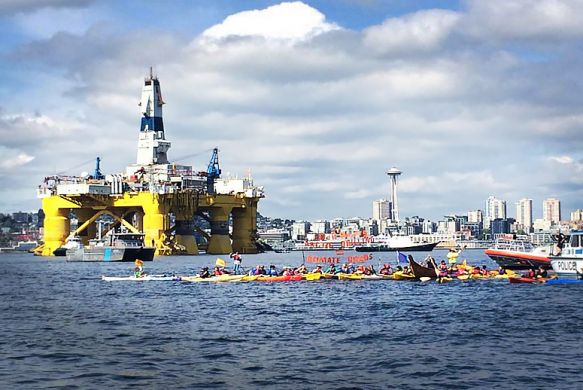- Blog
- Food & Agriculture
- Alaska beware: Shell Oil is on its way, and it’s larger, louder and dirtier than ever
Alaska beware: Shell Oil is on its way, and it’s larger, louder and dirtier than ever

Donate Now!
Your contribution will benefit Friends of the Earth.
Stay Informed
Thanks for your interest in Friends of the Earth. You can find information about us and get in touch the following ways:
Shell Oil has spent many years and billions of dollars in the reckless pursuit of oil in the American Arctic Ocean. All that is standing in their way from starting exploratory drilling this summer is a few remaining permits from the federal government. Shell could not have gotten this far, however, without the help of the federal government, specifically, the Bureau of Ocean Energy Management within the Department of the Interior. Despite the scientific unknowns and inherent risks associated with offshore oil and gas development, the Bureau of Ocean Energy Management held an oil and gas lease sale, Lease Sale 193, in the Chukchi Sea in 2008. Shell Oil paid a record $2.1 billion to develop the 29.4 million acre lease.
In 2013, Shell took the first steps towards realizing its Arctic drilling dream by moving its drilling fleet from Seattle to an area about 70 miles from Alaska’s shoreline to drill exploratory wells, but it didn’t take long for that dream to turn into a nightmare. Storms forced its drilling rig, the Kulluk, to run aground, its oil spill containment dome failed, and reports of safety and environmental violations led to fines for exceeding air pollution permits. Shell subsequently suspended its Arctic drilling operations, but not for long. Shell submitted a revised exploration plan, which the Bureau of Ocean Energy Management conditionally approved in May 2015 pending receipt of drilling permits from the Bureau of Safety and Environmental Enforcement and authorizations under the Marine Mammal Protection Act.
Shell’s revised Exploration Plan is the largest, loudest and dirtiest drilling proposal ever submitted for the Chukchi Sea. Compared to the 2012 version, the revision calls for three times more support vessels, a second drilling rig, three times more helicopter flights, and predicts seven times more pollution discharges into the ocean. The Bureau of Ocean Energy Management nevertheless concluded that Shell’s exploratory drilling operations will not have significant environmental effects. The Bureau’s approval represents a failure to adequately assess the risks associated with drilling and the potential of a large oil spill if Shell pursues its exploratory drilling operations in the Chukchi Sea.
On June 2, 2015, Friends of the Earth joined other environmental and local Alaska-based groups to legally challenge the Bureau of Ocean Energy Management’s approval of Shell’s revised Exploration Plan. We argue that the agency failed to include potentially significant environmental effects, such as marine mammal distribution and habitat use, and failed to assess the particular risks of a large oil spill during the exploratory phase. The Bureau of Ocean Energy Management claims that many of the specific impacts of Shell’s revised Exploration Plan were evaluated in its broader environmental impact analysis of the original lease, but also admitted there were information gaps to be resolved when making site-specific decisions, such as Shell’s revised Exploration Plan.
Unfortunately, it appears that rushed and inadequate analyses of the potential environmental impacts of oil and gas exploration and development in the Chukchi Sea are becoming habitual at the Bureau of Ocean Energy Management. The assumption is that the public will accept assurances from the federal government and Shell that this time around, things are different, but should we trust them? Probably not, as one of Shell’s oil rigs is already falling apart and already failed a Coast Guard inspection.
Yet, there is hope for stopping Shell from drilling in the Chukchi Sea this summer. Shell has encountered significant citizen opposition in Seattle, where it hopes to harbor its drilling fleet until exploratory drilling operations can commence. Seattle Mayor Ed Murray has called for Shell to obtain a new permit, and the King County industrial-waste program denied a permit for discharge of waste water into the county’s regional sewer system from Shell’s port home at Terminal 5. Even Shell’s investors are starting to question the company’s record on climate change. At the annual general meeting in May, shareholders voted to require the company to assess whether its activities align with international climate goals and efforts to limit global warming to 2 degrees Celsius. Shell’s revised Exploration Plan clearly does not, as the latest science tells us that in order to stay under that temperature threshold, development of Arctic oil is off the table. Together, our legal challenge and on-the-ground citizen activism can put a stop to Shell’s risky and dangerous endeavor, and leave Arctic oil in the ground where it cannot destroy our climate.
